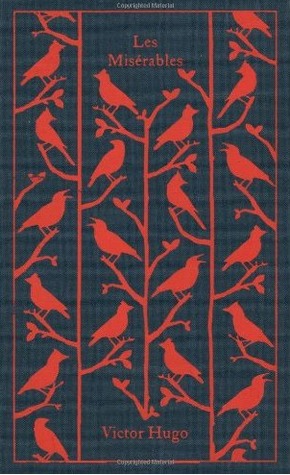“Les Miserables” by Victor Hugo
HEY, Y’ALL! I FINISHED ALL 1231 PAGES OF LES MISERABLES!
Before I read this book, I didn’t believe in abridgements of books. Now I do. Seriously, this book begs to be abridged. The edition I read was lightly abridged, and it was still overly long, with stultifying digressions and redundancies, even aside from the two (on cloisters and argot) that Denny, the translator of this edition, chose to put as endnotes. Long chapters that digressed away from the story, on related things like the Paris sewers, were almost always slogs that sometimes defied this reader’s will to keep going. If you are going to read this book, I recommend that you skip digressions. You can tell which they are because they don’t have the main characters. I believe you will lose little or nothing. Perhaps this is me being a cretin or a lowly literate reader, but I stand by this advice.
If the book were only the story of Jean Valjean, Marius , Cosette, Fantine, Javert, Eponnine, the Thenardiers and Gavroche, then this would be a whopping good tale. See the success of the musical as proof. Interestingly, I found the book to have a much more involving and satisfying end than did the 2012 film adaptation, and I was amazed that near the end, after so many pages, I sped up to a gobbling pace.
A word about the particular edition, the lovely Penguin Hardback Classic with the red cardinals. Many of those cardinals disappeared over the course of the reading in little flakes of red paint. These Hardback Classic editions are lovely objects (I have several), but alas, do not stand up well to actual reading. The Penguin trade paperback version is one of the only film tie-in covers I don’t find offensive, plus it would have been easier to schlep around for the many weeks I was reading. For portability and true unabridged-ness, I tried the Signet mass-market edition edited by Fahnestock and Macafee, but switched to the Denny HC because it was pretty, because the MMPB print was too small for my aging eyes, even with bifocals, and because the translation to me felt stiff.

January 31st, 2013 at 1:26 pm
That’s a hard-core reading project and I’m impressed! I know myself too well to tackle this one, especially after reading your report. I’ll start it, struggle, avoid starting other books and watch more TV instead and then feel like a lame-ass when I give up midway through.
January 31st, 2013 at 3:00 pm
Jennifer, I forgot to mention that this would make a great new year reading project. It’s got 365 subchapters of 61 long chapters of 4 sections, so about 3 to 4 pages per subchapter. If you started Jan 1, read just a few pages a day, you’d be done in a year and it would take hardly any time at all.
It would, however stretch out the deadly sections excruciatingly. So perhaps, a short chapter a day, except for the boring ones, and you’d be done well within a year with a tiny daily commitment! In fact, there’ve got to be at least 31 mini chapters of the boring bits; you could start tomorrow!
Also, my husband and I started together thinking it would be a great couple’s reading project but one or the other of us was always way ahead/behind, and now he’s still not finished. So I can’t really recommend it for tandem reading, either.
February 1st, 2013 at 8:28 pm
Yes, I have heard about the digressions in Les Miserables. In fact, that is one of the primary reasons I hesitate to begin the book again.
February 2nd, 2013 at 9:31 am
I don’t know. I agree that the political/historical parts where Hugo writes about people none of us have ever heard of and who add no value to the story are skippable. But the sewer and the cloister chapters are actually quite interesting to me anyway and they set a tone for the setting of the story that I think makes it richer and more intense. (INot sure that’s the right adjective? Maybe “deep” or “vivid”.) Yeah, you can skip those and the whole battle of Waterloo, except the part where Thenardier rescues somebody, and the argot chapter and it’s OK, but I would argue that at the least there is good writing (essay writing) there, too.
February 2nd, 2013 at 9:44 am
Sherry, I see what you mean, but my editor’s finger was twitching. I don’t think it’s good writing to go on and one in alternate pages. I would have preferred to have that history severely edited to remove the many, many redundancies, and interspersed with the story to support it, rather than stop it cold. What surprised the heck outta me was that he was writing as if this were a serial with those long long chapters, but he wasn’t. I’m reading Dickens, and his social and historical commentary is much shorter and interspersed, not as appended and ponderous.